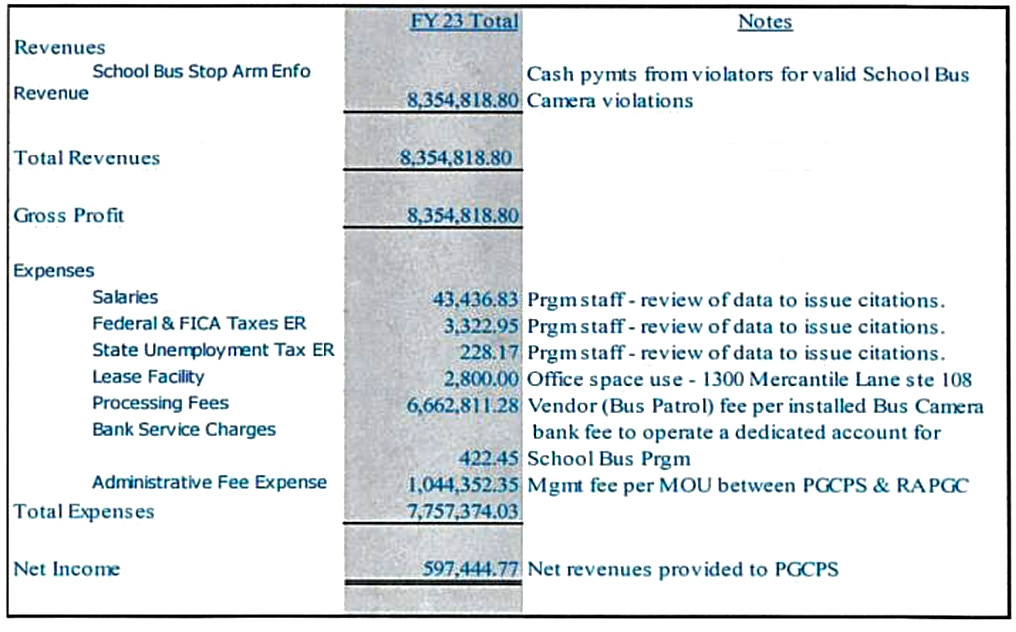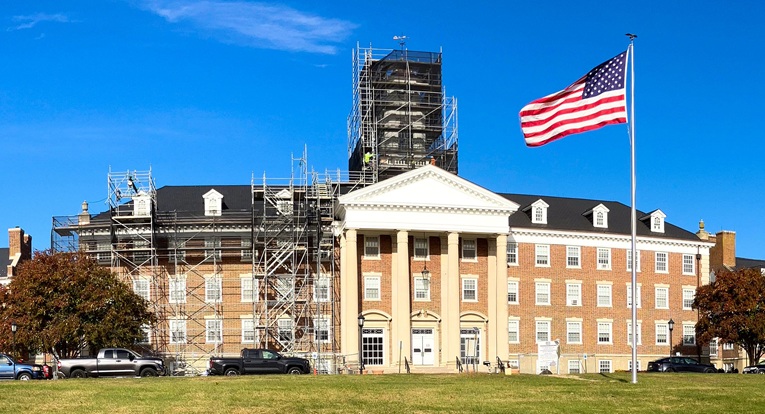Battling ongoing transportation challenges, in September 2023 Prince George’s County Public Schools (PGCPS) contracted 4Mativ Technologies to provide a transportation audit for a cost of $210,600. At the start of this school year PGCPS implemented numerous changes including bus stop locations, distances between them, walking zones and, most significantly, school start and end times. The school system also changed its parent information portal and grade center from SchoolMax to ParentVUE/Synergy (see the June 20, 2024, issue). With all the changes, their decision to keep the unpopular and frequently non-functioning StopFinder seems baffling (for more on StopFinder see page 6).
PGCPS’ five-year contract for over $1.3 million with Transfinder, creator of StopFinder, shows it was paid for by another company, BusPatrol, a company that was accused of bribery and corruption by Maryland Delegate David Moon in a 2023 committee hearing. In order to understand why BusPatrol pays for the app, one needs to look at another contract that diverts millions of dollars in traffic fines (for vehicles not stopping for school buses) away from the county and to that same private company, BusPatrol.
TransFinder Contract
The contract with TransFinder to use their StopFinder app (obtained through a Maryland Public Information Act (MPIA) request) shows that in 2020 PGCPS committed to a five-year contract, whose stated cost was over $1.34 million. It was paid in full by the company BusPatrol. The News Review attempted to find out if PGCPS was obliged to use TransFinder in order for BusPatrol to pay for the StopFinder contract or if alternatives were considered. PGCPS’ Director of Purchasing and Supply Services De’Nerika Johnson told this newspaper to file a public information act request, though it’s unlikely that information is in public records. BusPatrol’s website lists TransFinder as a “Technology Partner.” Following the five-year contract PGCPS has the option of continuing to use TransFinder at an annual fee of $123,287, paid for by BusPatrol, according to the contract.
BusPatrol’s Agreement
On May 1, 2023, then-chair of Prince George’s County Council Edward Burroughs sent a budget overview memo that noted an increase of $4.9 million over the previous year’s budget. “The increase is primarily due to increases in operating costs to support the new School Bus-Arm Camera safety program in partnership with Prince George’s County Public Schools,” states the memo’s Budget Overview. “The $6.5 million increase in the School Bus Stop Arm program expenditures in FY2022 is a result of the agreement between the Prince George’s County Public School System and BusPatrol (the vendor). BusPatrol is paid a contracted fixed ‘Technology Fee’ of $400 per month for each school bus that is equipped with a BusPatrol Camera. The fee is continuous with the operation of the program,” it states in the Facilities and Operating Revenues and Expenditures section.
An FY2023 chart summarizing the revenue and expenditures of the School Bus Stop-Arm Camera program shows a gross profit of $8,354,818.80 from violations. From that amount BusPatrol is paid $6,662,811.28 in processing fees. After other expenses, PGCPS itself makes a net income of $597,444.77, dwarfed by BusPatrol’s share of over $6.6 million.
Concerns about Contracts
In September 2022, an audit report for Montgomery County Public Schools (MCPS) raised concerns about their partnership with BusPatrol. That five-year contract began in May 2016, with five annual renewal options, and allowed BusPatrol to install and operate cameras, which BusPatrol would own and maintain, on MCPS school buses. According to the report, BusPatrol’s cameras would also be able to “monitor the conduct of drivers and students inside the bus along with global positioning units to track the buses.”
The audit states that according to a July 2019 report from the Montgomery County Office of the Inspector General (OIG), “The OIG initiated the review in August 2018 after the County was made aware of concerns regarding the vendor’s history of prior convictions involving fraud and bribery in another state where it operated a similar program. Although the report disclosed that employees of the County or MCPS did not violate a rule, law, or procedure, or had any inappropriate relationship with the vendor, the report identified the following two findings related to the County:
1.) The business case for this program was built around the desired use of a predetermined vendor rather than an objective analysis to design an effective and economical method to achieve an identified outcome.
2.) County officials relied, at least in part, on information provided by a criminal conspirator in vetting the vendor and they continued to rely on vendor supplied information when considering the future of the program.”
In addition to the concerns of the OIG report, Maryland’s Office of Legislative Audits said it “received an allegation on our fraud, waste, and abuse hotline that MCPS had entered into a contract to place monitoring cameras on school buses that diverts fines to a private entity when they should be paid to the County.” “Based on our review, we were able to substantiate the allegation as the contract provided that all funds were to go to the vendor until the vendor recovered its cost of investment,” stated the audit. Finding 10 of the audit report on MCPS is that: “MCPS contracted with a vendor for a school bus camera system without a competitive procurement process or a fixed total cost to be paid. In addition, the contract lacked sufficient details to enable effective monitoring of the amounts invoiced and paid to the vendor.”
BusPatrol’s Corporate History
Maryland Delegate David Moon, speaking at an Environment and Transportation Committee hearing on House Bill 849 in 2023, cited the findings of the audit of MCPS, raising concerns that BusPatrol was “convicted of bribery in another state” and “flagged by a DLS audit that Montgomery County’s procurement was flawed, and no bid, and didn’t have proper controls …” In response BusPatrol issued a public statement that they had “purchased intellectual property stemming from a now-defunct company (Force Multiplier Solutions, or FMS) that developed nascent school bus stop arm enforcement technology. That defunct company unfortunately had certain individuals in corporate leadership who violated the law. None of those individuals work for or are even associated with BusPatrol. We strongly condemn the actions of these individuals as they are not representative of anyone at our company or our mission to protect students on their journey to and from school.” Records show that in 2019 the CEO of FMS was sentenced to seven years in federal prison for what the United States Attorney’s Office, Northern District of Texas, described as “a bribery scheme that took down multiple public officials and precipitated the collapse of Dallas County Schools.”
Future Plans
PGCPS was asked if they plan to renegotiate a better share of the over $8.35 million in revenue from fines from the county’s school buses with BusPatrol and if BusPatrol will be involved in selecting the next transportation management system and bus tracking app or paying for them, since the five year contract ends this year. Johnson told us to file a public information act request, though since we were asking about future plans for these contracts that information won’t be available in public records.
The News Review reached out multiple times to every person listed under PGCPS’ Media Inquiries and Public Information team, for whom we also left messages, with the exception of Director of Communications Meghan Gebreselassie, whose mailbox was consistently full. On MondaySenior Public Information Specialist Lynn McCawley answered our call to her cell phone and said she’d get back to us but hadn’t by time of press.
The authors have children who are students at PGCPS.




